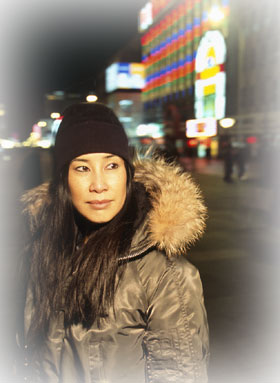|
ASIAN AMERICAN PERSONALITIES |
CONTACT US
|
ADVERTISING INFO
© 1996-2013 Asian Media Group Inc
No part of the contents of this site may be reproduced without prior written permission.
GOLDSEA | ASIAMS.NET | ASIAN AMERICAN PERSONALITIES
Tele-Kinetic Explorer
PAGE 5 OF 8
LL: Actually we grew up with our dad.

PHOTO STEVE HARRIS © NGT&F |
GS: Isn't that a bit unusual?
LL: That is also kinda unusual. My mother was very much a part of our lives, but we grew up with our father.
GS: How did your father manage to get custody awarded?
LL: We had a choice. My mom was moving to Los Angeles and she asked which way we wanted to go. My grandmother was here with my father in Sacramento and I didn't want to go to another school. So we chose to stay in Sacramento rather than rough it in Los Angeles. So on so many differnt levels, I had a different upbringing. Part of the reason I guess I became such an ambitious kid was I fought hard to kind of escape my surroundings.
GS: Did having divorced parens have any other effect that you can recognize?
LL: I just become a much more independent person. The person with whom I settle down, I hope I'm with that one person and not two or three others.
GS: Did your mother remarry?
LL: No, neither of them remarried.
GS: What caused them to break apart?
LL: They shouldn't have been married in the first place. My mom came to this country in her early 20s. My father came over when he was 7. They kind of rushed into it. They had only gone out for 4 months before and they're both physically attractive people. They were just a little hasty and there was a lot of family pressure as well.
GS: You've said that your parents would have preferred that you go into law or medicine or some other traditional career. How do they now feel about your career now?
LL: They're absolutely thrilled. They actually changed their minds when I started bringing home paychecks that were fairly decent.
CONTINUED BELOW
GS: Better than lawyers' paychecks?
LL: Let's put it this way. I put myself through four years of USC which isn't cheap.
GS: From your work on Channel One?
LL: I come from my family that I wouldn't even say was middle class. We were probably lower-middle class. So for me to be able to do that was justification enough for them that [my career] would be okay.
GS: You have been one of the most visible Asian American celebrities since your days at Channel One and The View. Do you ever feel burdened by that celebrity?
LL: Yeah, it is very burdensome, to be honest with you. The thing that is most frustrating is, I feel like I do more for the community than most people in the business. I've spoken at numerous universities to Asian organizations and I've done a lot of work with Asian organizations as well. I've really really made an effort because it's important to me and it's disappointing when “the Community” feels the need to criticize and cast judgement on my every move. That's really disappointing.
GS: I take it you're referring to the Old Navy commercial?
LL: Not exclusively the Old Navy commercial. Even when I was on The View I considered myself to be one of the more vocal Asians, and I've brought Asian issues to the table on numerous occasions. But I can't do it every day.
GS: So the criticism was that you weren't dealing with Asian issues?
LL: Yeah, when I've brought it up more than anyone I've seen on television frankly.
GS: The View isn't exactly a show about heavy social issues.
LL: But I did still. Like when Time magazine put an Asian eye on the cover, I was very upset about that. I talked about growing up Asian, and so many different topics I brought up. But if you didn't see it, you would assume I had never addressed these issues but you can only bring it up sparingly. The fact of the matter is that it's a mainstream daytime talk show and you can only talk about the issues so often. So I get it from both sides. Members of the Asian community would always say you don't talk about it enough. Members of the non-Asian community say I wear my Asianness on my sleeve. I've really gotten to the point, to be honest with you, where I've got to live for me.
PAGE 6
| “It's disappointing when “the Community” feels the need to criticize and cast judgement on my every move. That's really disappointing.” |
